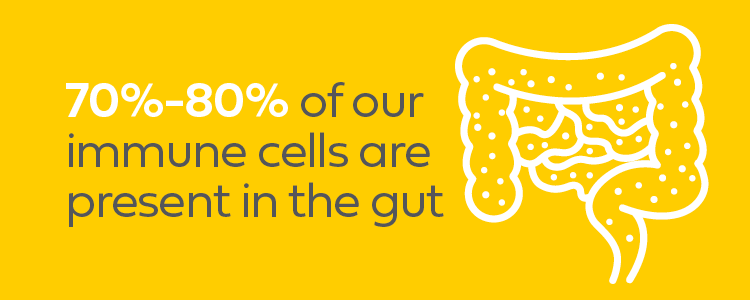Vitamins for the immune system

This week we’re turning the spotlight to the immune system – our body’s built-in defence force. A strong immune system is crucial for warding off illnesses and maintaining optimal health. While various factors contribute to immune function, certain vitamins play a pivotal role in supporting the body’s defence mechanisms.
With the help with our in-house experts, we delve into the importance of the immune system, how to care for it, the best vitamins that help fortify your immune system and how aguulp’s Immunity supplement provides these essential vitamins for optimal immune health.
What is the importance of our immune system?
Our immune system is a complex network of cells, tissues, and organs that work together to defend our body against harmful invaders, such as bacteria, viruses, and other pathogens (organisms that cause disease). It’s our body’s frontline defence against illnesses and infections. When functioning correctly, it identifies threats, neutralises them, and helps us recover when we’re sick. The immune system is vital for maintaining our health and wellbeing.
Defence Against Infections:
The primary role of the immune system is to defend the body against infections. It does so by identifying and neutralising harmful microorganisms. White blood cells, also known as leukocytes, play a central role in this defence mechanism.
Surveillance and Recognition:
The immune system constantly surveys the body for foreign substances. It recognizes the difference between self and non-self cells, allowing it to target and eliminate invaders while sparing healthy cells.
Adaptability and Memory:
Upon encountering a specific pathogen, the immune system generates a targeted response. This response is not only immediate but also leads to the development of immunological memory. This memory allows the immune system to respond more effectively upon subsequent exposures to the same pathogen.
Prevention of Autoimmune Diseases:
The immune system’s ability to distinguish self from non-self is crucial in preventing autoimmune diseases, where the immune system mistakenly targets the body’s own cells and tissues. Proper regulation ensures that immune responses are appropriately targeted.
Tissue Repair and Homeostasis:
After fighting off infections or healing injuries, the immune system is involved in tissue repair and maintaining the body’s internal equilibrium (homeostasis). This involves a delicate balance between immune responses and anti-inflammatory processes.
How do we look after our immune system?
A well-functioning immune system is essential for overall health and well-being. While genetics play a role, you can actively support your immune system through lifestyle choices. Here are some practical tips to help you take care of your immune system:
Balanced diet: Nutrient-dense foods like fruits, vegetables, lean proteins, and whole grains, provide the vitamins and minerals to help fortify immune cells, regulate inflammation, and maintain overall health, ensuring our body’s defence mechanisms are well-equipped to combat infections and promote well-being.
Regular exercise: Physical activity enhances immune function by promoting circulation, reducing inflammation, and supporting the release of endorphins that contribute to a positive mood. Engaging in physical activity also improves cardiovascular health, which indirectly supports immune responses, leading to a stronger, more resilient body.
Quality sleep: During restorative sleep, the body produces cytokines and immune cells that fight infections and repair tissues. Adequate sleep also helps regulate immune responses, contributing to a well-coordinated defence against illnesses and maintaining optimal overall health.
Stress management: Chronic stress can suppress our immune system making the body more susceptible to infections. Implementing stress management techniques, such as meditation, yoga, or deep breathing, this not only promotes emotional well-being but also supports immune responses, fostering a balanced and resilient body.
Maintaining a healthy gut microbiome: 70% of immune cells reside in the gut which in itself highlights the importance of the role of our gut health and immune system. The gut, often referred to as the “second brain,” is home to a vast array of microorganisms, collectively known as the gut microbiota. These microorganisms play a pivotal role in various bodily functions, including digestion, nutrient absorption, and, importantly, immune system regulation.
The relationship between our immune system and our gut health
 The gut microbiome influences the immune system by interacting with immune cells and regulating their activity. The gut microbiome communicates with immune cells, helping to balance immune responses. This balance is critical to prevent excessive inflammation, which can lead to autoimmune disorders, and to ensure a robust response against pathogens.
The gut microbiome influences the immune system by interacting with immune cells and regulating their activity. The gut microbiome communicates with immune cells, helping to balance immune responses. This balance is critical to prevent excessive inflammation, which can lead to autoimmune disorders, and to ensure a robust response against pathogens.
The gut lining also serves as a barrier that prevents harmful substances from entering the bloodstream. A healthy gut microbiota supports the integrity of this barrier, reducing the risk of harmful pathogens or toxins entering the body.
A balanced gut microbiota also contributes to immune tolerance, where the immune system avoids attacking harmless substances like food particles. This reduces the risk of developing allergies or intolerances. For more information, read our blog on the link between gut health and our immune system.

Vitamins for the immune system
Vitamin A: plays a crucial role in maintaining the integrity of the skin and mucosal barriers, which are the body’s first line of defence against pathogens. It also helps regulate the immune response and enhances the activity of white blood cells.
Vitamin C: Known for its immune-boosting properties, it enhances the production and function of white blood cells, which are integral to fighting infections. Additionally, vitamin C is a powerful antioxidant that protects cells from damage caused by harmful molecules called free radicals.
Vitamin D: often referred to as the “sunshine vitamin,” is essential for immune function. It aids in regulating and strengthening our immune response and supports the body’s defence against infections. Adequate vitamin D levels are associated with a reduced risk of respiratory infections.
Vitamin B5: is an essential nutrient that contributes to the production, maintenance, and functioning of immune cells.
Vitamin B6: crucial for the synthesis of antibodies, which are proteins produced by the immune system to target and neutralise harmful pathogens. Antibodies play a central role in the body’s defence against infections.
Vitamin B9 (Folate): vital for the production and maturation of immune cells, particularly white blood cells. Folate supports DNA synthesis and repair, which are essential for cell division and growth.
Vitamin E: a potent antioxidant that protects cells from oxidative stress and supports immune function. It also enhances the activity of immune cells and promotes the body’s ability to fight infections.
Aguulp for Immunity supplement and the vitamins
Aguulp for Immunity is specifically designed to support your immune system. Our unique liposomal formula ensures that these vital vitamins are effectively absorbed and utilised by your body; included in each sachet essential vitamins A, B, C, D & E, as well as your full daily requirements of omega-3 fatty acids and antioxidants developed from plants.
Omega-3 fatty acids, particularly eicosapentaenoic acid (EPA) and docosahexaenoic acid (DHA) – which are both in our aguulp for immunity supplement, have anti-inflammatory properties. They can help modulate the body’s inflammatory responses by reducing the production of pro-inflammatory molecules.
By incorporating aguulp for immunity into your routine, you’re providing your immune system with the nutrients it needs to perform at its best. Remember, a robust immune system is key to keeping us healthy and resilient.
If you’re looking for the ultimate immune boost, why not take our aguulp for gut and immunity dual pack? Taken together you are giving your immune system and overall health the best chance at keeping the pesky colds at bay.
Aguulp for gut: our prebiotic supplement containing a clever blend of soluble fibre (GOS, FOS, Inulin) which feeds our good bacteria in our gut for a healthy, balanced microbiome, optimising our digestive function
Aguulp for immunity: boost your body’s immune system’s defence containing 8 key vitamins and minerals to support and improve our overall immune function.
References:
Meydani, S. N., et al. (1997). Vitamin E supplementation enhances cell-mediated immunity in healthy elderly subjects. The American Journal of Clinical Nutrition, 66(4), 911-916.
Huang, H. Y., et al. (2019). The anti-inflammatory effects of vitamin E on immune function. Nutrients, 11(4), 978.
Semba, R. D. (1998). Vitamin A, immunity, and infection. Clinics in Dermatology, 16(4), 423-430.
Iddir, M., et al. (2020). Vitamin A: A potential solution to reduce the impact of COVID-19. International Journal of Infectious Diseases, 99, 455-457.
Aranow, C. (2011). Vitamin D and the immune system. Journal of Investigative Medicine, 59(6), 881-886.
Martineau, A. R., et al. (2017). Vitamin D supplementation to prevent acute respiratory tract infections: systematic review and meta-analysis of individual participant data. BMJ, 356, i6583.
Carr, A. C., & Maggini, S. (2017). Vitamin C and immune function. Nutrients, 9(11), 1211.
Hemilä, H., & Chalker, E. (2013). Vitamin C for preventing and treating the common cold. Cochrane Database of Systematic Reviews, 1.
Janeway, C. A., Travers, P., Walport, M., & Shlomchik, M. J. (2001). “Immunobiology: The Immune System in Health and Disease.” Garland Science.
Medzhitov, R. (2010). Inflammation 2010: new adventures of an old flame. Cell, 140(6), 771-776.
Abbas, A. K., Lichtman, A. H., Pillai, S., & Baker, D. L. (2017). “Cellular and Molecular Immunology.” Elsevier.
Ahmed, R., & Gray, D. (1996). Immunological memory and protective immunity: understanding their relation. Science, 272(5258), 54-60.
Cooper, G. S., Stroehla, B. C. (2003). The epidemiology of autoimmune diseases. Autoimmunity Reviews, 2(3), 119-125.
Belkaid, Y., & Hand, T. W. (2014). Role of the microbiota in immunity and inflammation. Cell, 157(1), 121-141.
Clemente, J. C., Ursell, L. K., Parfrey, L. W., & Knight, R. (2012). The impact of the gut microbiota on human health: an integrative view. Cell, 148(6), 1258-1270.
Honda, K., & Littman, D. R. (2016). The microbiota in adaptive immune homeostasis and disease. Nature, 535(7610), 75-84.
Sommer, F., & Bäckhed, F. (2013). The gut microbiota—masters of host development and physiology. Nature Reviews Microbiology, 11(4), 227-238.
Rooks, M. G., & Garrett, W. S. (2016). Gut microbiota, metabolites and host immunity. Nature Reviews Immunology, 16(6), 341-352.






